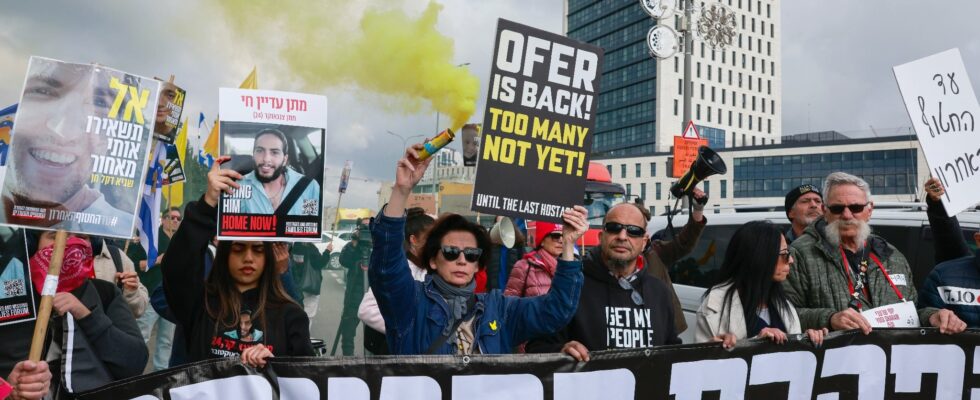“We cancel everything and unleash hell” on Gaza, promised the president of the United States Donald Trump on Monday, February 10, if Hamas did not free “all of” all of Israeli hostages on Saturday. These threats “will only complicate things,” Sami Abu Zouhri, a leader of the Palestinian Islamist movement, quickly reacted on Tuesday. “Donald Trump must remember that there is an agreement which must be respected by both parties and that it is the only way to bring the prisoners back,” he said.
For several days, The fragile truce between Hamas and Israel, which entered into force on January 19 and whose first phase is supposed to end on March 1, is roughly put to the test. Negotiated by Qatar with the help of the United States and Egypt, this ceasefire was to offer a break after 15 months of bloody and deadly clashes in Gaza. He has already enabled the release of 16 Israeli hostages, kidnapped on October 7, 2023 during the attack on Hamas having launched hostilities – in exchange for some 700 Palestinians held by Israel. In total, 33 Israeli hostages are supposed to be released during the first phase of the truce, including eight announced as dead.
But on Monday, Hamas announced that it was postponing Sine Die the next exchange of hostages to take place on Saturday. The reason for this blockage: Israel, according to the Palestinian group, has multiplied the violations of the truce from the first day. But that’s not all. The conditions under which these operations take place stiffen tensions, with the backdrop of the shock declarations of Donald Trump on the future of the Gazaoui territory.
Hosting exchanges stretched in the field
The last exchange of hostages, Saturday January 8, was made under particularly tense conditions, alerted the International Committee of the Red Cross. The three Israelis returned to their territory were first presented, with an emaciated face and the exhausted air, in front of a crowd of about 200 people and behind a cord of Hamas weapons, before being forced to express in Hebrew. A spectacle condemned as “cruel” by Israel. After the last exchanges, Hamas, for its part, denounced the “low -fire murder” of Palestinian prisoners in the Israeli prisons, while seven of them had to be hospitalized following their release.
The Palestinian prisoner club, an NGO, also accuses Israel of having attacked at home, on the night of Friday to Saturday, families awaiting the return of their relatives. Questioned by AFP, the Israeli army has since replied that “warning patrols had been carried out [en Cisjordanie occupée] To remove Hamas flags and prevent preparations in the area. “The celebrations, in Gaza as in the occupied West Bank, were also prohibited for the return of Palestinian prisoners.
Donald Trump provocations and delay in negotiations
Donald Trump’s statements have finished throwing cold on the ceasefire process. By proposing an American takeover of Gaza to make it “the French Riviera of the Middle East” and a displacement of its population to Egypt or Jordan, the American president has aroused violent reactions, of the Arab community as of the international community. Bassem Naïm, executive in Hamas, immediately denounced an “ethnic cleaning” project and warned against a “collapse” of the truce agreement. While Benyamin Netanyahu praised the idea, saying on Fox News that Israel was going to “do the work” to implement it.
In the immediate future, Hamas’ decision to stop hostage exchanges has been described as “total violation” by Israel, which announces that its army is ready “to all scenarios”. Hamas assures its side that the door remains “open” so that the liberation of Israeli hostages against Palestinian prisoners “takes place according to the planned plan”, next Saturday, “once Israel has acquired its obligations” .
Faced with this growing discord, negotiations on the second phase of the ceasefire, which were to start on January 27 in Doha in Qatar, are late. The Israeli Prime Minister finally “ordered” on Saturday, “sending a delegation to Qatar”.
Egypt will convene an Arab summit on February 27 to discuss the “serious developments” of the Palestinian situation in the face of Donald Trump’s statements. The support of the Israeli government in terms of the American president “weakens and destroys negotiations on a ceasefire agreement and encourages a resumption of fighting,” warned Cairo. US Secretary of State Marco Rubio is expected to go to the Middle East in the coming days.
